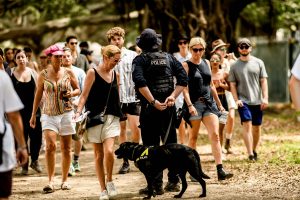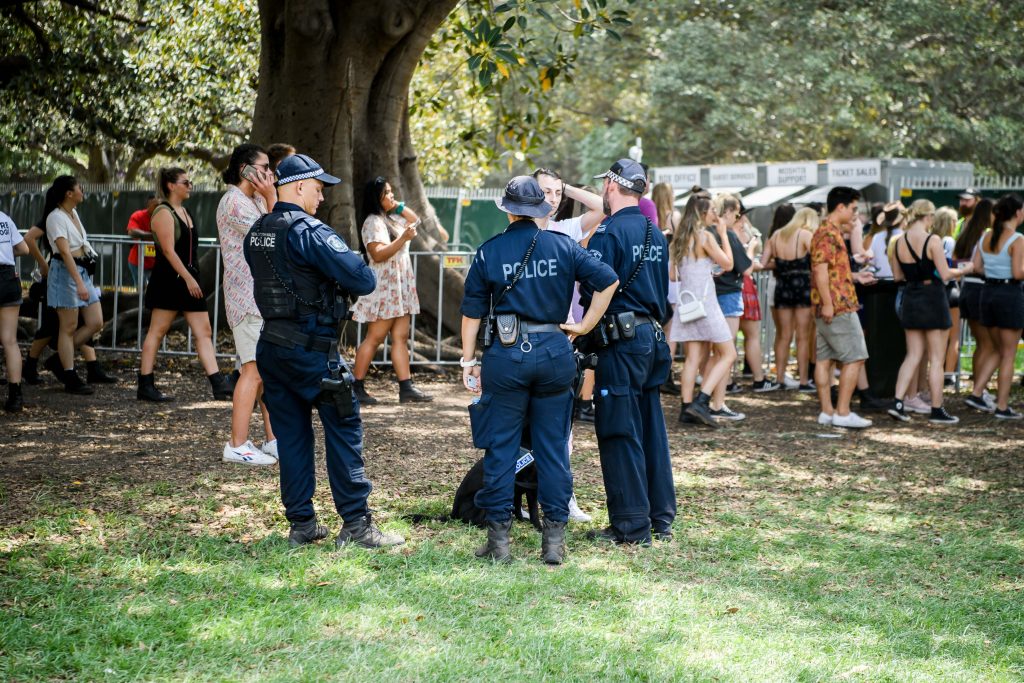Ashley Mar
The idea of the police performing a strip-search on anyone is already a contentious topic, but the recent Law Enforcement Conduct Commission has shown just how worrying Australia's strip-search laws are.
Shivering. Shaking. Sweating from the palms, your pulse is racing: you’ve been forced to explain yourself, and you just want to throw up. That’s how it feels – even if you’ve done nothing wrong – when the cops say they’re going to strip-search you.
And that’s exactly how some of these officers look, on the stand at the Law Enforcement Conduct Commission to answer questions about their roles and behaviour at the Lost City music festival on February 23, 2019.
I don’t think any of them ever want to strip-search a kid ever again. They’re squirming and sweating, gurning at the mouth, eyes racing around the room, fidgeting and forgetful. All we want to do is ask you a few questions. What’s the matter? There’s nothing to worry about if you’ve done nothing wrong.
“You’re just making this up as you go along, aren’t you?” Chief Commissioner Adams says to one red-nosed detective sergeant from Liverpool command, GEN 8, whose hands are white-knuckled, gripping the arms of the witness’ chair. He looks like he’s about to leap out of it.
“No, sir, I’m not.” His eyes are pained, wincing with denial. He’s trying to explain to the commission why his report doesn’t properly reflect his reason for searching eight kids, after a security guard conducted an impromptu sting by buying a “pink cap” from one of them.
A couple of plain-clothed security guards thought they witnessed a drug sale and took it upon themselves (as far as we can tell) to make a buy. When the unauthorised undercover made the buy, he lifted his sunglasses above his head to signal to his partner that the deal had gone down.
What the hell were they thinking, I wonder; that it would be just like in the movies? How could a professional security guard not understand the concept of entrapment? But a larger concern still, how could a qualified police officer with years of experience fail to understand how much trouble this would be down the line? Especially if significant facts were left out of his filed reports; this seems to be a massive problem.
Love Music?
Get your daily dose of everything happening in Australian/New Zealand music and globally.
There’s a huge element of ‘you have to be there’ to these public hearings. More people should go, and the hearings should be better advertised, and resourced (although the state Liberal Government is inclined to disagree, cutting $6 million from a budget of $22.3 million over the next four years).
With an issue this big, you’d think it would be easy to fill a small courtroom with concerned members of the public, but there isn’t even a public toilet here for people to use; the nearest one is the robot toilet outside St James station, across Elizabeth Street. Encouraging, isn’t it?
It really fills me with faith in our legal system to know that I’m allowed to sit in on the hearing, but it’s diminished somewhat by the sign outside the chamber telling me I can’t even take a piss break here… and the hearings go all week. What are disabled people supposed to do? What ever happened to ‘universal franchise’? It is an exercise of our democratic rights to bear witness to an investigation, especially of the executive branch… but not if you need to go to the loo, apparently.
Of course, you can read the transcripts of the hearings, 454 pages of them for Operation Gennaker, but you have to be there to see the way witnesses behave, the body language that communicates far more than what they have to say with their mouths.

The police presence at the Sydney leg of the 2020 Laneway Festival. Photo by Ashley Mar.
Visibility is an essential part of the process, because from what I saw, these cops were exhibiting the same kind of behaviour you could expect to see on the stand at a Magistrate’s Court. Yet none of them faced imprisonment here – they’re so scared of losing their jobs that they can’t hold it together. How would they act if we forced them to submit to strip-searches?
And to be sure, “forced” is the name of the game for these coppers, by hook or by crook too. Senior constable GEN 12 is shown in the Gennaker transcript (p.403) revealing that it was his practice to “ask” his strip-search victims to lift up their testicles and “squat and cough”.
Chief Commissioner Adams continues his interrogation: “You would agree, that would be taken as an order or command? The question of consent doesn’t arise, does it?”
“It depends on what – their knowledge of what their rights are,” GEN 12 says.
“Do you think they have a right to say ‘No’?”
“If they know their law, I guess they do.”
“I see. So you take advantage of their ignorance of the law, do you?”
“No.”
Maybe this is one bad apple, but after watching a string of such folk give evidence under objection for days on end, I’m no longer inclined to give such broad benefit of the doubt. You may have seen the footage of a Sydney dog-squad copper trying to make his sniffer dog indicate by using his hand to force the dog to sit. That’s a special unit right there, to be sure.

The police presence at the Sydney leg of the 2020 Laneway Festival. Photo by Ashley Mar.
The abuses of civil liberties this organisation has visited on more than 300 underaged people in the past year are absolutely beyond justification. Some individuals have been traumatised to the point that none of them will ever trust a police officer ever again, and that is to the disadvantage of NSWPOL, the problem being that an effective police force needs to command respect, not fear.
But fear is the currency they choose to trade in these days, and in December, it was most severely revisited on a female officer, GEN 5, who couldn’t be present at the Commission (for some strange reason), instead presenting by video conference.
And nary a more miserable display have I ever seen from an officer of the law than from this officer, filling the link-up screens in her chunky flak-jacket. Under the Chief Commissioner’s questioning, she looks nervous. Even on the TV screens in the commission, it looked like beads of sweat were forming on her top lip. Her visage was a twisted rictus of pain, self-sorrow, and abject wet-your-pants fear.
Most bizarrely of all was the way she couldn’t hold herself together, and the coping mechanisms she chose to employ. By the end of her testimony, she had both hands inside the same arm holes of her flak-jacket, and her index fingers pushed up her nose, both nostrils. It was unreal, to say the least.
And don’t think the Chief Commissioner was hard on her, either. His tone was soft and caring all the way through his questioning, unlike the barbed probing he gave other officers present. No, at no stage was the female officer put under pressure, yet she crumbled all the same. When he told her it was unlikely she’d be required to give further evidence, he meant it. She seemed completely unreliable as a witness, at least, to this untrained, humble eye.
There’s so much more to this story, but internal division at the LECC led to a decision to stand down the Chief Commissioner and allow his tenure to end in the new year. This decision came after he told a parliamentary inquiry that some NSW police officers had corrupt involvement with the methamphetamine trade.
In early February, a member of the notorious ‘Strike Force Raptor’ was stood down from active field duties, and now he’s on admin patrol. That came about as a result of an LECC inquiry into a traffic stop. Money well-spent. But without Michael Adams QC, our sole police watchdog (the LECC replaced the Police Integrity Commission in 2017) has lost some of its sharpest teeth. At time of writing, the future of the NSW inquiry into police strip-searches is unknown; when the final report will come out is anybody’s guess.
Indeed, we should always ask: who’s watching the watchers; who’s searching the strip-searchers? The public has to demand full accountability, or our children, unable to protect themselves, will continue to face these abuses at festivals, on the streets, at school… regardless of whether they’ve actually broken the law, or not.
Even when they have, although police insist they are protecting children by stopping them from taking drugs, the opposite is often true.
When threatened with the prospect of a police interaction, those who do possess illicit drugs can sometimes “panic-drop” – that is, when one becomes fearful he or she will be searched, the punter loses composure and decides to immediately consume all the drugs they have on their person, regardless of quantity, in order to escape detection and enter the venue. Although adults must be held responsible for their own actions, minors are another story altogether.
So, tell us again how strip-searching them reduces the risk of personal harm?
It really doesn’t. Strip-searching does, however, subject many innocent and impressionable young people to sexual assaults, and that in turn makes them fear the police. When people fear, they do not trust, and when they don’t trust, they don’t call the police when they should. It’s as simple as that.
Such presumably unintended consequences of strip-searching innocent or offending individuals are examined in a study funded by the Redfern Legal Centre, and they force us to observe that, by failing to do their duty properly, police can do great harm to innocent individuals, as well as their own work, and that is not the purpose of the Law.
And now the latest, cheapening news: that quotas were in place. Officers are obligated to fill these quotas, or …what? Face a fate worse than the LECC? Or are they incentivised in a more positive way? Falling short on last year’s quota will have an impact on motivation to find suspects to search, and one has to wonder if quota-driven goals gamify the process of suspect-acquisition. Sniffer dogs are only wrong 64% of the time – that kind of action would have to give a little thrill every time it pays off?
The strip-search saga has been little less than an unwholesome travesty of police authority, and its widespread abuse, with only a few good men and women standing up for the rights of the general public to be protected according to the law – not exploited on the emotional whims and personal experiences of individual officers.
Their only job is to follow the law, but by stepping outside of it they don’t just make a mockery of their colleagues, their superiors, and of course, the citizens they are charged to protect – they also become outlaws.
This full article was featured in the Rolling Stone Australia print magazine issue #001. To receive this back issue, or to receive every Rolling Stone magazine delivered to your door via an annual subscription, check out our subscription options here.



































